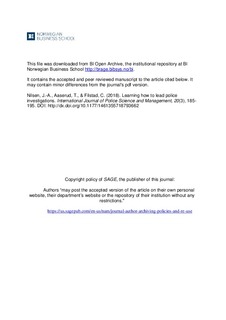| dc.contributor.author | Nilsen, Jon-Andre | |
| dc.contributor.author | Aaserud, Terje | |
| dc.contributor.author | Filstad, Cathrine | |
| dc.date.accessioned | 2018-10-19T07:00:12Z | |
| dc.date.available | 2018-10-19T07:00:12Z | |
| dc.date.created | 2018-09-03T12:15:57Z | |
| dc.date.issued | 2018 | |
| dc.identifier.citation | International Journal of Police Science and Management. 2018, 20 (3), 185-195. | nb_NO |
| dc.identifier.issn | 1461-3557 | |
| dc.identifier.issn | 1478-1603 | |
| dc.identifier.uri | http://hdl.handle.net/11250/2568755 | |
| dc.description.abstract | The aim of this article was to investigate how police investigation leaders learn leadership and whether the facilitation of learning activities and learning methods might bridge the well-known gap between teaching and learning leadership. Using action research, we constructed an ‘i-leader’ learning pool consisting of police investigation leaders. The pool provided interactive and collaborative learning activities that included reflection, knowledge sharing and social support. Participants were receptive to this learning initiative, but also argued that ‘learning by doing’ is most important because it allows for communication and cooperation between colleagues in the context of their everyday leadership practice. They acknowledged the need for reflection and argued that the pool provides important reflection time, which they lack in their everyday practice. Participants also found the learning methods, particularly the ‘group support methodology’ and the new network useful for their own leadership development. However, using these new learning methods ‘back home’ was more challenging. Participants did not have time to prioritize and develop this new network. Providing Learning methods and building a network takes time and must be relevant to everyday leadership practice. The significance of their leadership practice and how to accumulate experience as the basis for reflection was acknowledged, but still needs to be applied within leadership practice. Bridging the gap between teaching and learning is not just about providing learning and reflection methods, but also about learning how to apply new knowledge through experience, where reflection Ensures that learning in practice is not ‘due to change’. | nb_NO |
| dc.language.iso | eng | nb_NO |
| dc.publisher | Sage | nb_NO |
| dc.relation.uri | http://hdl.handle.net/11250/2560481 | |
| dc.title | Learning how to lead police investigations | nb_NO |
| dc.title.alternative | Learning how to lead police investigations | nb_NO |
| dc.type | Journal article | nb_NO |
| dc.type | Peer reviewed | nb_NO |
| dc.description.version | acceptedVersion | nb_NO |
| dc.source.pagenumber | 185-195 | nb_NO |
| dc.source.volume | 20 | nb_NO |
| dc.source.journal | International Journal of Police Science and Management | nb_NO |
| dc.source.issue | 3 | nb_NO |
| dc.identifier.doi | 10.1177/1461355718793662 | |
| dc.identifier.cristin | 1606210 | |
| dc.description.localcode | 1, Forfatterversjon | nb_NO |
| cristin.unitcode | 158,4,0,0 | |
| cristin.unitname | Institutt for ledelse og organisasjon | |
| cristin.ispublished | true | |
| cristin.fulltext | postprint | |
| cristin.qualitycode | 1 | |
